| Listing 1 - 9 of 9 |
Sort by
|

ISBN: 3518284681 9783518284681 Year: 1990 Volume: 868 Publisher: Frankfurt am Main Suhrkamp
Abstract | Keywords | Export | Availability | Bookmark
 Loading...
Loading...Choose an application
- Reference Manager
- EndNote
- RefWorks (Direct export to RefWorks)
#KVHA:Filosofie; Duits --- #KVHA:Fenomenologie; Duits --- Philosophy
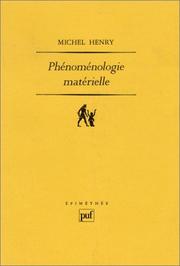
ISSN: 07680708 ISBN: 2130431402 9782130431404 Year: 1990 Publisher: Paris : PUF - Presses Universitaires de France,
Abstract | Keywords | Export | Availability | Bookmark
 Loading...
Loading...Choose an application
- Reference Manager
- EndNote
- RefWorks (Direct export to RefWorks)
En reposant la question fondamentale de la phénoménologie, et de la philosophie — la question de la donation —, en interprétant celle-ci non plus seulement, selon la pensée traditionnelle de l'Occident, comme apparition dans un monde mais comme l'étreinte invisible de la vie en son propre pathos, la phénoménologie matérielle soulève des problèmes nouveaux et paradoxaux.Trois d'entre eux font l'objet des présentes études : 1 / La matière de la conscience, l'Impression, n'est plus un contenu opaque attendant l'éclaircissement de la forme intentionnelle, ne s'exhibant que dans l'Ek-stase du Temps : elle accomplit la Révélation en elle-même, dans sa chair affective. Au lieu de définir une discipline mineure, vite oubliée, la phénoménologie hylétique — matérielle — dessine la tâche de l'avenir. 2 / La possibilité de connaître la vie invisible donne son sens au problème de la méthode phénoménologique et exige que celle-ci soit repensée entièrement. 3 / La relation à autrui change elle-même de nature si, avant de pouvoir être reconnue au milieu du monde, elle prend corps dans la vie où naissent tous les vivants, l'autre aussi bien que moi-même — si elle est un « pathos-avec ».
Phenomenology --- Phénomenologie --- Phénoménologie --- 141.322 --- Fenomenologie --- Phenomenology. --- 141.322 Fenomenologie --- Phénoménologie --- Philosophy, Modern --- Metaphysics --- Husserl, Edmund,
Book
ISSN: 11423072 ISBN: 2246412617 9782246412618 Year: 1990 Publisher: Paris Grasset
Abstract | Keywords | Export | Availability | Bookmark
 Loading...
Loading...Choose an application
- Reference Manager
- EndNote
- RefWorks (Direct export to RefWorks)
13:141.32 --- 141.322 --- 165.62 --- 165.62 Fenomenologie --- Fenomenologie --- 141.322 Fenomenologie --- 13:141.32 Fenomenologische antropologie --- Fenomenologische antropologie --- --Arendt, Hannah, --- --1817 --- 1 DE TOCQUEVILLE, ALEXIS --- Filosofie. Psychologie--DE TOCQUEVILLE, ALEXIS --- 1 DE TOCQUEVILLE, ALEXIS Filosofie. Psychologie--DE TOCQUEVILLE, ALEXIS --- --165.63 --- 165.63 --- 165.63 Rationalisme. Intellectualisme. Aufklärung. Verlichting. Enlightenment --- Rationalisme. Intellectualisme. Aufklärung. Verlichting. Enlightenment --- Heidegger, Martin, --- Philosophie --- Phénoménologie --- --Phenomenology --- Naturalism --- Phénoménologie --- Naturalisme --- Phenomenology --- Philosophical anthropology --- History --- --13:141.32 --- Heidegger, Martin, 1889-1976 --- Arendt, Hannah, 1906-1975

ISBN: 2870093861 9782870093863 Year: 1990 Volume: 187 Publisher: Liège : Mardaga,
Abstract | Keywords | Export | Availability | Bookmark
 Loading...
Loading...Choose an application
- Reference Manager
- EndNote
- RefWorks (Direct export to RefWorks)
Existence [Philosophie de l' ] --- Existentialism --- Existentialisme --- Existentiefilosofie --- Existenzphilosophie --- Fenomenologie --- Philosophie de l'existence --- Phénoménologie --- Psychanalyse --- Psychoanalyse --- Existential psychology --- Phenomenological psychology. --- Psychologie existentielle --- Psychologie phénoménologique --- Freud, Sigmund, --- Phenomenological psychology --- Psychologie phénoménologique --- Psychoanalysis --- United States --- Philosophy --- Freud, Sigmund --- Freud, Sigmund, - 1856-1939 --- Freud, Sigmund, 1856-1939 --- Psychanalyse et philosophie --- États-Unis
Book
ISBN: 0792306783 9401067376 9400905556 9780792306788 Year: 1990 Volume: 31 Publisher: Dordrecht Kluwer
Abstract | Keywords | Export | Availability | Bookmark
 Loading...
Loading...Choose an application
- Reference Manager
- EndNote
- RefWorks (Direct export to RefWorks)
Cogito --- Ethics --- Ethiek --- Ethique --- Fenomenologie --- Ik (Filosofie) --- Moi (Philosophie) --- Phenomenology --- Phénoménologie --- Self (Philosophy) --- Ethics. --- Self. --- Phenomenology. --- Husserl, Edmund, --- Self --- Personal identity --- Consciousness --- Individuality --- Mind and body --- Personality --- Thought and thinking --- Will --- Philosophy, Modern --- Deontology --- Ethics, Primitive --- Ethology --- Moral philosophy --- Morality --- Morals --- Philosophy, Moral --- Science, Moral --- Philosophy --- Values --- Husserl, Edmund --- Husserl, Edmond --- Husserl, Edmund, - 1859-1938.
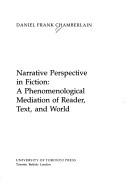
ISBN: 0802058388 9786612039744 1282039741 1442677538 9781442677531 9780802058386 9781282039742 Year: 1990 Volume: vol 59 Publisher: Toronto, [Ontario] ; Buffalo, [New York] ; London, [England] : University of Toronto Press,
Abstract | Keywords | Export | Availability | Bookmark
 Loading...
Loading...Choose an application
- Reference Manager
- EndNote
- RefWorks (Direct export to RefWorks)
Daniel Chamberlain examines the nature of narrative perspective in a manner that does not presuppose a passive definition of perception. Rather, he considers perspective as a medium through which the potential meanings of texts are disclosed and through which to share the vital experience of narrative from today's familiar and culturally distant worlds.The book is divided into two parts. The first part address narrative perspective within a theoretical framework. Chamberlain uses this in order to consider narrative perspective as an integral part of the more general process of perception that mediates language and the experience of texts. Perception is here understood as an active recreation of the world at every moment; as an opening through which one's self-awareness and awareness of the world are correlated. By considering narrative perspective in terms of perception, equal importance is given to its temporal and spatial aspects. The dialectic of time and space inevitably comes to bear on narrative perspective through the techniques, strategies, and medium of a text's transmission. Part one concludes with an examination of contemporary definitions of narrative perspective and with the presentation of an alternative approach to its study.The second part offers a reading of two texts, each of which clearly presents the major issues facing this inquiry. The narrative perspective of each is considered as occupying a degree of similarity and difference within the dialectic of time and space. Each perspective is, in turn, correlated to the prevalent medium of discourse within its cultural milieu.
Fenomenologie en literatuur --- Hermeneutics --- Hermeneutiek --- Herméneutique --- Narration (Rhetoric) --- Narration (Rhétorique) --- Narrative writing --- Phenomenology and literature --- Phénomenologie et littérature --- Point de vue (Littérature) --- Point of view (Literature) --- Point of view (Literatuur) --- Point-of-view (Literature) --- Verhaal (Retoriek) --- 82-3 --- 82-3 Proza. Fictie. Narratologie --- Proza. Fictie. Narratologie --- Fiction --- Phenomenology and literature. --- Literature --- Narrative (Rhetoric) --- Rhetoric --- Discourse analysis, Narrative --- Narratees (Rhetoric) --- Persona (Literature) --- History and criticism. --- Philosophy --- Technique --- Narration (Rhetoric). --- Point of view (Literature). --- History and criticism --- 82-3 Fiction. Prose narrative --- Fiction. Prose narrative
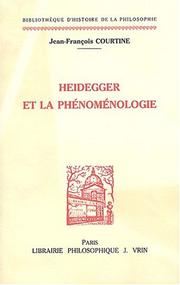
ISBN: 2711610284 9782711610280 Year: 1990 Volume: vol *134 Publisher: Paris Vrin
Abstract | Keywords | Export | Availability | Bookmark
 Loading...
Loading...Choose an application
- Reference Manager
- EndNote
- RefWorks (Direct export to RefWorks)
Theory of knowledge --- Heidegger, Martin --- Being --- Etre (Philosophie) --- Fenomenologie --- Ontologie --- Ontology --- Phenomenology --- Phénoménologie --- Zijn (Filosofie) --- Zijnsleer --- Heidegger, Martin, --- History. --- -Philosophy, Modern --- History --- -History --- Phénoménologie --- Khaĭdegger, Martin, --- Haĭdegger, Martin, --- Hīdajar, Mārtin, --- Hai-te-ko, --- Haidegŏ, --- Chaitenger, Martinos, --- Chaitenker, Martinos, --- Chaintenger, Martin, --- Khaĭdeger, Martin, --- Hai-te-ko-erh, --- Haideger, Marṭinn, --- Heidegger, M. --- Haideger, Martin, --- Hajdeger, Martin, --- הייגדר, מרתין --- היידגר, מרטין --- היידגר, מרטין, --- 海德格尔, --- Chaintenker, Martin, --- Hāydigir, Mārtīn, --- Hīdigir, Mārtīn, --- هاىدگر, مارتين, --- هىدگر, مارتين, --- Phenomenology - History.
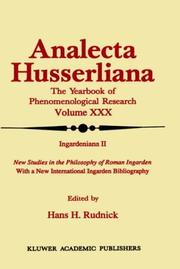
ISBN: 0792306279 9780792306276 9401073783 9400919646 Year: 1990 Volume: 30 Publisher: Dordrecht Kluwer
Abstract | Keywords | Export | Availability | Bookmark
 Loading...
Loading...Choose an application
- Reference Manager
- EndNote
- RefWorks (Direct export to RefWorks)
Ingarden, Roman --- Contributions in phenomenology --- Contributions in aesthetics --- Influence --- Phenomenology --- Aesthetics [Modern ] --- 20th century --- Ingarden, Roman, 1893- - Contributions in phenomenology. --- Ingarden, Roman, 1893- - Contributions in aesthetics. --- Ingarden, Roman, 1893- - Influence. --- Phenomenology. --- Aesthetics, Modern - 20th century. --- Tymieniecka, Anna-Teresa. --- Aesthetics, Modern --- Philosophy, Modern --- Aesthetics --- History --- Tymieniecka, A. T. --- Influence. --- Ingarden, Roman, --- Contributions in phenomenology. --- Aesthetics. --- Aesthetics, Modern. --- Esthetica. --- Fenomenologie. --- Filosofie. --- Literatuurtheorie. --- Husserl, Edmund, --- Ingarden, Roman Witold, --- Tymieniecka, Anna-Teresa, --- Aesthetics, Modern - 20th century --- Ingarden, Roman, - 1893-1970 - Contributions in phenomenology --- Ingarden, Roman, - 1893-1970 - Aesthetics --- Ingarden, Roman, - 1893-1970 - Influence. --- Tymieniecka, Anna-Teresa, - 1923-2014 --- Husserl, Edmund --- Ingarden, Roman, - 1893-1970
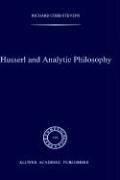
ISBN: 0792304675 9401073422 9400918887 9780792304678 Year: 1990 Volume: 116 Publisher: Dordrecht ; Boston, MA ; London : Kluwer,
Abstract | Keywords | Export | Availability | Bookmark
 Loading...
Loading...Choose an application
- Reference Manager
- EndNote
- RefWorks (Direct export to RefWorks)
The principal differences between the contemporary philosophic traditions which have come to be known loosely as analytic philosophy and phenomenology are all related to the central issue of the interplay between predication and perception. Frege's critique of psychologism has led to the conviction within the analytic tradition that philosophy may best defend rationality from relativism by detaching logic and semantics from all dependence on subjective intuitions. On this interpretation, logical analysis must account for the relationship of sense to reference without having recourse to a description of how we identify particulars through their perceived features. Husserl' s emphasis on the priority and objective import of perception, and on the continuity between predicative articulations and perceptual discriminations, has yielded the conviction within the phenomenological tradition that logical analysis should always be comple mented by description of pre-predicative intuitions. These methodological differences are related to broader differences in the philosophic projects of analysis and phenomenology. The two traditions have adopted markedly divergent positions in reaction to the critique of ancient and medieval philosophy initiated by Bacon, Descartes, and Hobbes at the beginning of the modern era. The analytic approach generally endorses the modern preference for calculative rationality and remains suspicious of pre-modern categories, such as formal causality and eidetic intuition. Its goal is to give an account of human intelligence that is compatible with the modern interpretation of nature as an ensemble of quantifiable entities and relations.
Philosophy of language --- Theory of knowledge --- Husserl, Edmund --- Analyse (Filosofie) --- Analyse (Philosophie) --- Analyse linguistique (Philosophie) --- Analysis (Philosophy) --- Analysis [Linguistic ] (Philosophy) --- Analysis [Logical ] --- Analysis [Philosophical ] --- Analytical philosophy --- Analytische filosofie --- Fenomenologie --- Filosofische taalanalyse --- Intuitie --- Intuition --- Linguistic analysis (Filosofie) --- Linguistic analysis (Philosophy) --- Logical analysis --- Perceptie --- Perceptie (Filosofie) --- Perception --- Perception (Philosophie) --- Perception (Philosophy) --- Phenomenology --- Philosophical analysis --- Philosophie analytique --- Philosophy [Analytical ] --- Phénoménologie --- Psychologism --- Psychologisme --- Waarneming --- Waarneming (Filosofie) --- Husserl, Edmund, --- Phenomenology. --- Psychologism. --- Perception. --- Intuition. --- 1 HUSSERL, EDMUND --- Academic collection --- #GROL:SEMI-1-05'19' Huss --- Phenomenological psychology --- Philosophy, Modern --- Supraliminal perception --- Cognition --- Apperception --- Senses and sensation --- Thought and thinking --- Intuition (Psychology) --- Intuitionalism --- Insight --- Analysis, Linguistic (Philosophy) --- Analysis, Logical --- Analysis, Philosophical --- Analytic philosophy --- Philosophy, Analytical --- Language and languages --- Methodology --- Philosophy --- Logical positivism --- Semantics (Philosophy) --- Filosofie. Psychologie--HUSSERL, EDMUND --- 1 HUSSERL, EDMUND Filosofie. Psychologie--HUSSERL, EDMUND --- Analysis (Philosophy). --- Phénoménologie --- Husserl, Edmond --- Husserl (edmund), philosophe allemand, 1859-1938 --- Critique et interpretation --- Philosophie analytique.
| Listing 1 - 9 of 9 |
Sort by
|

 Search
Search Feedback
Feedback About
About Help
Help News
News